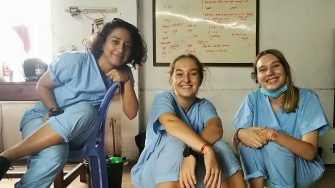
Over the summer break, a group of UNSW Girls in Engineering Club members who were the lucky winners of the GIE Summer Intensive Competition undertook a 3-week humanitarian engineering program run by Engineering World Health. It was an incredible sneak peek for the girls into humanitarian engineering. They collaborated with students from Uganda, Rwanda and Kenya to solve healthcare problems in low-resource communities. Jessica Phung and Nicole Consolacion were two of the students who took part in the project, and we asked them to reflect on their experience.
Jessica Phung
“Over the course of 3-weeks, I was able to indulge in the mindset of an engineer working towards providing solutions in a low-resource setting, where there is limited interventional capacity. The experience was worthwhile as it illuminated the significance of using innovation and creative problem-solving to pioneer solutions that were sustainable and feasible to overcome barriers with regards to limited access to adequate healthcare in such circumstances. By working alongside others and with the help of facilitators, I was able to enjoy the very process of tackling challenges to healthcare and humanitarian engineering itself!
The program was a good opportunity that not only affirmed my interest in engineering, but it also sparked a passion for the applications of engineering in making an impact towards certain communities. The phases of a project and insight into humanitarian engineering itself, allowed me to explore how engineering can not only make a difference, but use obstacles as opportunities to create change and improve the lives of others.
The program’s focus on the discrepancies in the quality of healthcare provided in a low-resource setting in comparison to what we’re used to seeing in an everyday hospital, was able to shed light on some real-world problems. Although it is admirable what new feats we have achieved with the power of engineering, it is always good to draw attention to using innovation and creative problem solving to meet universal challenges and facilitate equitable access to basic human needs like adequate healthcare.”
Nicole Consolacion
“At the entry of the competition, my submission involved an informative video of a design I created of a Prosthetic Leg for Sprint Athletes! During my design process I was particularly inspired by the 2020 Paralympics which led to my research of the mechanics of prosthetic limbs. The branch of Biomedical Engineering appealed to me the most from this interest which I am now studying as a Double Degree at UNSW!
In the GIE Summer Intensive Program, we were provided with three main engineering issues: Sterilisation, Oxygen Delivery and a Medical Supply Chain. Following from this, my group designed a Solar-powered Oxygen Analyser which directly addressed Oxygen Delivery but also contributed to the Medical Supply Chain. Being aware of these issues allowed me to understand that engineering is so integral in our society. The implications from Oxygen Delivery involved the requirement to take extra precaution with handling oxygen canisters as they have the potential to be launched as dangerous projectiles; this also expanded within the lack of equipment of the Medical Supply Chain which entirely affected hospitalisation rates. It was such an interesting experience to apply these issues in contextual sense; the onset of the COVID-19 pandemic provided my group an immediacy towards providing respiratory aid and this assistance in humanitarian engineering is what inspires me the most!”
Find out more about humanitarian engineering opportunities at UNSW Sydney.
